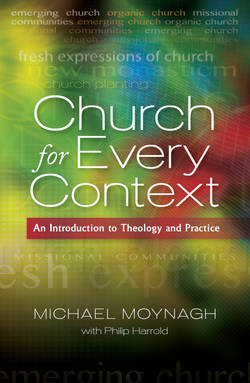Читать книгу Church for Every Context - Michael Moynagh - Страница 35
На сайте Литреса книга снята с продажи.
Paul’s strategy
ОглавлениеPaul was strategic, as Dunn highlights. First, Paul had ‘a commitment to pioneer evangelism, to pursue his mission only in virgin territory’ (Dunn, 2009, p. 544). In 1 Corinthians 3.6, for example, Paul sees himself as having started something new while Apollos continued the work.
Second, he was determined to take the gospel to Jews first and then to the Gentiles. This was primarily ‘a strategic and principled concern’ that the gospel was the climax of God’s saving purpose for Israel and through Israel (Dunn, 2009, p. 547). But it also made practical sense. In the synagogues were Jews and ‘God-fearing’ Gentiles, who were attracted to the monotheistic faith of Israel but had not converted to Judaism. These God-fearers were likely to be more open to the gospel than their polytheistic compatriots, and – along with the Jews – had some knowledge of the Hebrew Scriptures on which Paul and his team could build. Jews and God-fearers were well placed to form churches that would draw in Gentiles from outside the synagogues.
Third, Paul had a ‘grand strategy to fulfil the mission of Israel to the nations and to fulfil Israel’s eschatological hopes in regard to the nations’ (Dunn, 2009, p. 543). In his mission, Paul saw himself as acting on behalf of Israel. Dunn follows Rainer Riesner, who argues that the rough direction of Paul’s mission matched the principal direction of travel envisaged in the list of nations in Isaiah 66.19. As one influence on him, Paul seems to have viewed his mission as a fulfilment of Isaiah 66. He was going out to the nations at the end times. The financial gift from his churches for Jerusalem may have symbolized the nations gathering at Zion (Riesner, 1998, pp. 245–56).
Was this a view that Paul had from the start of his mission from Antioch, or did it emerge gradually in the light of his experience? If the latter, Paul can perhaps be seen as a practical theologian (in today’s language), learning from experience as he reflected theologically upon it.12
Paul’s fourth strategic priority was to breed in his new churches ‘a communal life lived in the light of the coming kingdom – deeply, but not openly, subversive’ (Dunn, 2009, p. 555). Not least, the brotherly and sisterly relationships of equality encouraged by Paul contrasted starkly with the hierarchical patron–client structures of the day.
Within this framework of principles, Paul was pragmatic and opportunist like many church founders today. As Schnabel notes, he did not have a rigid plan or method. Led by the Spirit, Paul responded when doors opened. He preached in synagogues, market places, lecture halls, workshops and private homes as the opportunity arose (Schnabel, 2008, pp. 304–6).
